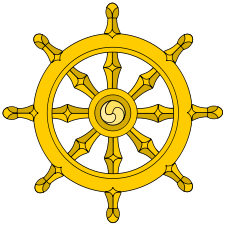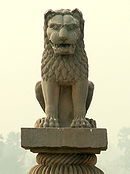Buddhism in Sri Lanka

An ancient Buddha statue from Avukana
Sri Lanka
Buddhism in Sri Lanka is primarily of the Theravada school, and constitutes the religious faith of about 70% of the population.[1] According to traditional Sri Lankan chronicles (such as the Dipavamsa), Buddhism was introduced into Sri Lanka in the 2nd century BCE by Venerable Mahinda, the son of the Emperor Ashoka, during the reign of Sri Lanka's King Devanampiyatissa. During this time, a sapling of the Bodhi Tree was brought to Sri Lanka and the first monasteries were established under the sponsorship of the Sri Lankan king. The Pali Canon, having previously been preserved as an oral tradition, was first committed to writing in Sri Lanka around 30 BCE.
Sri Lanka has the longest continuous history of Buddhism of any Buddhist nation, with the Sangha having existed in a largely unbroken lineage since its introduction in the 2nd century. During periods of decline, the Sri Lankan monastic lineage was revived through contact with Myanmar and Thailand. Periods of Mahayana influence, as well as official neglect under colonial rule, created great challenges for Theravada Buddhist institutions in Sri Lanka, but repeated revivals and resurgences- most recently in the 19th century CE- have kept the Theravada tradition alive for over 2000 years.
Christian missionaries and colonialism
From the 16th century onward, Christian missionaries and Portuguese, Dutch and British colonizers of Sri Lanka have attempted to convert the local population to Christianity. In the late 19th century, a national Buddhist movement started, inspired by the American Buddhist Henry Steel Olcott, and empowered by the results of the Panadura debate between a Christian priest and the Buddhist monk Migettuwatte Gunananda Thera.
Divisions in the Buddhist clergy
The different sects of the Sri Lankan Buddhist clergy are referred to as Nikayas, and three main Nikayas are:
- Siam Nikaya, founded in the 18th century by Ven. Upali, a Thai monk who was invited by the King of Kandy Kirti Sri Rajasinghe, and on the initiative of Ven. Weliwita Saranankara.
- Amarapura Nikaya, founded in 1800 with higher ordination obtained from Myanmar (Burma)
- Ramanna Nikaya, founded in 1864 by Ambagahawatte Saranankara.
Within these three main divisions there are numerous other divisions, some of which are caste based. There are no doctrinal differences among any of them.
See also

Distribution of Buddhism in Sri Lanka. Based on 2001 census data except for districts with numbers given in italics; these are from 1981 census
- Demographics of Sri Lanka
- Mahamevnawa Buddhist Monastery
- Ashoka
- Mahapandit Rahul Sankrityayan
Notes
External links
|
Buddhism in Asia |
|
Sovereign
states |
Afghanistan · Armenia1 · Azerbaijan1 · Bahrain · Bangladesh · Bhutan · Brunei · Burma2 · Cambodia · People's Republic of China · Cyprus1 · East Timor3 · Egypt4 · Georgia4 · India · Indonesia · Iran · Iraq · Israel · Japan · Jordan · Kazakhstan4 · North Korea · South Korea · Kuwait · Kyrgyzstan · Laos · Lebanon · Malaysia · Maldives · Mongolia · Nepal · Oman · Pakistan · Philippines · Qatar · Russia4 · Saudi Arabia · Singapore · Sri Lanka · Syria · Tajikistan · Thailand · Turkey4 · Turkmenistan · United Arab Emirates · Uzbekistan · Vietnam · Yemen
|
|
States with limited
recognition |
Abkhazia1 · Nagorno-Karabakh · Northern Cyprus · Palestine · Republic of China5 · South Ossetia1
|
|
Dependencies,
autonomies,
other territories |
Aceh · Adjara1 · Akrotiri and Dhekelia · Altai · British Indian Ocean Territory · Buryatia · Christmas Island · Cocos (Keeling) Islands · Guangxi · Hong Kong · Inner Mongolia · Iraqi Kurdistan · Khakassia · Macau · Nakhchivan · Ningxia · Papua · Sakha Republic · Tibet · Tuva · West Papua · Xinjiang
|
|
| 1 Sometimes included in Europe, depending on the border definitions. 2 Officially known as Myanmar. 3 Sometimes included in Oceania, and also known as Timor-Leste. 4 Transcontinental country. 5 Commonly known as Taiwan. |
|
|
Buddhism in Sri Lanka |
|
| Temples |
Temple of the Tooth · Mihintale · Gangaramaya Temple · Kothduwa temple · Kataragama
|
|
|
Solosmasthana
|
Mahiyangana · Nagadipa · Kelaniya · Sri Pada · Diva Guhava · Dighavapi · Muthiyangana · Tissamaharama · Jaya Sri Maha Bodhi · Mirisaveti · Ruwanwelisaya · Thuparamaya · Abhayagiri · Jetavanaramaya · Sela Cetiya · Kiri Vehera
|
|
|
Atamasthana
|
Jaya Sri Maha Bodhi · Ruwanwelisaya · Thuparamaya · Lovamahapaya · Abhayagiri · Jetavanaramaya · Mirisaveti · Lankarama
|
|

|
|
| Architecture |
|
Stupa
|
Isurumuniya · Rathna Prasadaya · Dakkhina Stupa · Naka Vihara · Kiribath Vehera
|
|
|
Cave temples
|
Vessagiri · Dambulla cave temple · Dimbulagala Raja Maha Vihara
|
|
|
Sculpture
|
Buduruvagala · Samadhi Statue · Toluvila statue · Avukana Buddha statue · Gal Vihara · Maligawila Buddha statue
|
|
|
| Notable monks |
Balangoda Ananda Maitreya Thero · Henepola Gunaratana · Madihe Pannaseeha Thero · Arahant Mahinda · Arahant Sangamitta · Maliyadeva · Narada Maha Thera · Walpola Rahula · Wariyapola Sri Sumangala · Migettuwatte Gunananda Thera · Gangodawila Soma Thero · Mapalagama Wipulasara Maha Thera · Nyanaponika Thera · Nyanatiloka · S. Mahinda
|
|
| Notable figures |
|
Buddhists
|
Peter De Abrew · Anagarika Dharmapala · Brahmachari Walisinghe Harischandra · Charles Alwis Hewavitharana · Don Carolis Hewavitharana · Chandana Jayarathne · Don Baron Jayatilaka · K. N. Jayatilleke · George Keyt · Neranjan Wijeyeratne · Nissanka Wijeyeratne
|
|
|
Philosophers
|
Henry Steel Olcott · Nalin de Silva
|
|
|
| Education |
Buddhist and Pali University of Sri Lanka · Ananda College · Nalanda College · Dharmaraja College · Dharmasoka College · Mahinda College · Maliyadeva College · Dharmapala Vidyalaya · Rahula College
|
|
| Culture |
Relic of the tooth of the Buddha · Esala Perahera · Vesak in Sri Lanka · Mahavamsa · Culavamsa · Dasa sil mata · Diyawadana Nilame · Kataragama deviyo · Saman (deity) · Vibhishana · Ran Salu · Sooriya Arana
|
|
| Politics |
Sinhalese Buddhist nationalism · Jathika Hela Urumaya · Champika Ranawaka · Udaya Gammanpila · Uduwe Dhammaloka · Ellawala Medhananda Thero · Athuraliye Rathana Thero
|
|
| Portal · Category · Glossary · Outline · Index |
|
|
Buddhism topics |
|
| Outline · Portal · Category · Glossary · Index |
|
| Foundations |
|
 |
|
| The Buddha |
Tathāgata · Birthday · Four sights · Physical characteristics · Footprint · Iconography · Films · Miracles · Family: (Suddhodana (father) · Maya (mother) · Yasodhara (wife) · Rahula (son)) · Places where the Buddha stayed · Buddha in world religions
|
|
| Key concepts |
|
|
| Cosmology |
Ten spiritual realms · Six Realms (Hell · Animal realm · Hungry Ghost realm · Asura realm · Human realm · Heaven) · Three planes of existence
|
|
| Practices |
Refuge · Buddhist devotion · Puja: (Offerings · Prostration · Chanting) · Merit · Paritta · Generosity · Renunciation · Morality: (Precepts · Bodhisattva vows · Patimokkha) · Threefold Training: (Morality · Concentration · Wisdom) · Four Divine Abidings: (Loving-kindness · Compassion · Sympathetic joy · Equanimity) · Perfections · Enlightenment Qualities · Seven Factors of Enlightenment · Bases of Power · Five Strengths · Faith · Effort (Four Right Exertions) · Mindfulness (Satipatthana) · Jhāna (Dhyāna) · Bhavana · Meditation: (Kammaṭṭhāna · Recollection · Smarana · Mindfulness of Breathing · Serenity meditation · Insight meditation · Shikantaza · Zazen · Kōan · Mandala · Tonglen · Tantra · Tertön · Terma)
|
|
| Attainment |
Types of Buddha · Private Buddha · Bodhisattva · Four stages of enlightenment: (Stream-enterer · Once-returner · Non-returner · Arahant)
|
|
| Monasticism |
Monk · Nun · Novice monk · Novice nun · Anagarika · Ajahn · Sayadaw · Zen master · Roshi · Lama · Rinpoche · Geshe · Tulku · Householder · Lay follower · Disciple
|
|
| Major figures |
|
|
| Texts |
|
|
| Branches |
|
|
| Countries |
Bangladesh · Bhutan · Burma · Cambodia · China · India · Indonesia · Japan · Korea · Laos · Malaysia · Mongolia · Nepal · Pakistan · Russia · Singapore · Sri Lanka · Taiwan · Thailand · Tibet · Vietnam · Middle East: (Iran) · Western countries: (Australia · France · United Kingdom · United States)
|
|
| History |
|
|
| Philosophy |
Abhidharma · Logic · Buddhology · Eschatology · Reality · God · Humanism · Engaged Buddhism · Socialism · Anarchism · Economics · Atomism · Evolution · Ethics · Fourteen unanswerable questions
|
|
| Culture |
|
|
| Miscellaneous |
|
|
| Buddhism and: |
Science · Psychology · Hinduism · Jainism · East Asian religions · Christianity · Theosophy · Gnosticism
|
|
| Lists |
Buddhas · Twenty-eight Buddhas · Bodhisattvas · Buddhists · Suttas · Books · Temples
|
|
|
Buddhism • Portal |
|
Articles: Glossary • History – Timeline • Schools • Texts • Countries – Regions • Culture • Lists: Temples – People – Index – Outline
|
|




